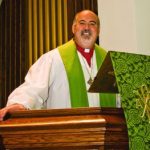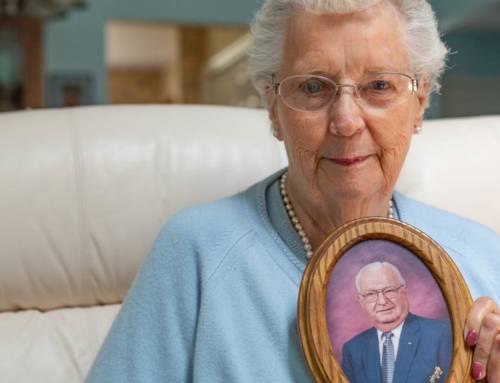
About the Author: Sunday Sermons from Sell Chapel are written by Rev. Preston Van Deursen, Director of Pastoral Care at the Masonic Village at Elizabethtown.
Recently, passengers on a flight from Hawaii to Los Angeles were surprised when a passenger got up from his seat and began pacing the aisles, reading his Bible very loudly. The other passengers and the flight crew were unable to get the man to sit down and be quiet, so they subdued the man and duct-taped him to his seat. When the plane landed, Los Angeles police officers took the man into custody.
What do you suppose got into this individual? Was he afraid of flying, or had he suffered some severe emotional trauma? Obviously, he was deeply disturbed.
Most of us would not make a scene on a plane, but that doesn’t mean our hearts are at peace. It doesn’t mean that we have no concerns. There are some of us who try in vain to sleep at night. And our digestive systems stay in turmoil. We snap at loved ones for no apparent reason. And we sabotage ourselves in our work and in our relationships. We’re troubled, unhappy people. And the sad thing is that we don’t know why.
Years ago, A Rabbi, Joshua Liebman wrote a best-selling book titled Peace of Mind. After the publication of this book, Rabbi Liebman was swamped with letters from people seeking peace. His mail was heavy; his telephone rang constantly; many people came to see him. He was a young, kind-hearted rabbi, only 38 years old. He tried to help everyone who contacted him. He died just three years later at the age of 41. He just could not stand up to the burden. But before he died, he said, “I am appalled at the multitude of people who have never learned to empty their minds.”
The first word that Jesus spoke to his disciples gathered together after his resurrection was the word, “Peace.” We read in our lesson from the Gospel: “When it was evening on that day, the first day of the week, and the doors of the house where the disciples had met were locked for fear of the Jews, Jesus came and stood among them and said, “Peace be with you.’ After he said this, he showed them his hands and his side. Then the disciples rejoiced when they saw the Lord. Jesus said to them again, “Peace be with you . . . “”
Peace be with you. How do we find peace of mind? How do we empty our minds of all the worry, fear, resentment, and pain that living in this world brings? How do we find the peace that Christ promises us?
One man said that he had been told that one way to achieve inner peace is to finish the things he’s started. He said, “Today I finished two bags of potato chips and a chocolate cake. I feel better already.”
We have a name for it, don’t we? Comfort food. Be honest about it, ladies. Chocolate. And gentlemen, perhaps a doughnut with your coffee helps relieve your stress–not your waistline, of course, but perhaps your stress level.
Sometime back a writer at the web site www.TheOnion.com published a fake press release. The press release was touting an imaginary snack food meant to ease what the writer called, the “hideously bleak emptiness of modern life.” The writer described this snack like this: “We’re proud to introduce T.C. McCrispee’s as the antidote you’ve been reaching out for. Our tasty new snack cracker will, if only for a few lovely moments, significantly lessen the aching, gnawing angst that haunts your very soul.”
According to this press release, participants in taste tests testified that the “satisfying crunch distracted them from the parade of tears that is life.” A fictitious spokesperson summed up the campaign by saying: “We’re selling the salty, unctuous illusion of happiness.”
And, of course, it is an illusion. Peace is not found in a snack food. Or a chemical. What are drugs–or alcohol, for that matter–but an inferior way to chemically induce peace of mind?
Jesus said, “Peace be with you.” But how and where do we find that peace?
For many of us, peace will come only when we come to grips with our past. Many of us are haunted by guilt, resentments, past failures, and lingering hurts.
David Spangler uses a wonderful analogy in his book, Everyday Miracles. He tells of living in New Orleans for several years. Situated near the mouth of the mighty Mississippi river, New Orleans was carved out of swamp land. Much of the city lies under sea level and remains dry only because of a complex network of canals and pumps that keep the ever-encroaching swamp at bay.
Just outside the city limits there are several wonderful parks that allow hiking and canoeing through the marsh. One of Spangler’s favorite spots is a swamp where there are raised boardwalks that run alongside several bayous for a couple of miles. Among the inhabitants of those bayous is one of nature’s most fearsome creatures–alligators.
Spangler learned from someone that alligators like marshmallows. That’s right-fluffy white marshmallows. All he had to do was toss one of those marshmallows out into the bayou, then sit back and wait. In a matter of minutes, a pair of eyes would surface and silently glide through the water toward the white, bobbing morsel of sugar.
Almost magically, two eyes would become four and four eyes would become six, then eight. He would watch the bushes growing over the water’s edge as, invariably, alligators would slink out of the shade and paddle over to the marshmallow. Often without warning, one of the brave reptiles would lunge forward and steal the marshmallow with a quick, powerful snap of its jaws.
What was mysterious to Spangler (and really creepy) was the fact that these alligators had silently been watching him all along. No doubt, they and countless others had watched him hike for the mile or so through the swamp and along the bayou. Their piercing eyes and acute sense of smell had sensed the presence of flesh and blood and they had stalked him like any other prey. All the while, he was completely unaware of their hungry vigil. It wasn’t until he tossed the marshmallow out into the water that they abandoned their hiding places in the brush that lined the bank and revealed their presence.
“Those alligators,” says David Spangler, “are like our memories. Even when we think we are alone and totally free, powerful memories swim just beneath the murky waters of our awareness. Just behind the bushes that grow in the landscapes of our lives are many unsuspected eyes that watch us and, if we allow, control us.”
That’s powerful, isn’t it? Some of us will never have peace of mind until we come to grips with the alligators in our past. Deep within the cells of our bodies reside the memories of every past sin, every past hurt, every past resentment we have ever experienced. Once in a while these past sins, past hurts, and past resentments rise up into our consciousness and trouble us and frighten us and throw us off balance. We may not even consciously know they are there, but still they eat at us and rob us of our joy. In order to have true peace of mind, some of us will have to come to grips with our past. How do we let go of the past? Christ has taken away our past with his death upon the cross. It’s gone. Forever. Jesus said to his disciples, “Peace be with you.” Notice what he does next. Says our Gospel, “After he said this, he showed them his hands and his side.”
In the ancient Greek language, two words were commonly used for canceling a contract. One of these words, “Chiazein,” meant “to cross out.” That’s what happened when you drew a big X over a contract and declared it null and void.
The other word used for this act, “exaleiphein,” meant “to wipe out.” In this manner, the words of the contract were washed off the page–much like clearing an Etch-a-Sketch pad; it would be as if they had never been written.
Author Judson Cornwall, in his book Let Us Enjoy Forgiveness, states that the word used for forgiveness in Colossians 2:13-14 is the word which means “wiped out as if they had never been.” Jesus didn’t just cover over our sins; he blotted them out as if they had never happened. Many of us, in order to experience God’s peace, will need to come to grips with our past.
Others of us will need to come to grips with our future. Some of us are living troubled lives because we are terrified of what tomorrow may bring. And who can blame us? This is a cruel world. We watch loved ones suffer. We hear of friends who are declining in health and spirit. And we know our day is coming. We are all living on borrowed time, and that is a terrifying thought to one preoccupied with the present world and its challenges. Meanwhile competition in the workplace grows more difficult, health care costs are exorbitant, drugs are all too common in the school yard. Our young people are confronted with violence on the home front and far across the seas. Who can help but be concerned about the future? In the face of such a world, how quickly we forget God’s promises.
Robert Strand, in his book, Especially for the Hurting Heart, has a wonderful discussion of Hebrews 13:5 in which we read these encouraging words: “God has said, ” Never will I leave you; never will I forsake you!”
Strand asks, “What ever does never mean?” And he notes that in the original language “never” is really a compounding of five negatives. Not that each negative is added to another. Rather, each negative is multiplied by the other. According to Strand, it really should read, “I will never, no, not ever, no never leave you or forsake you!” It is a synergistic compounding negative. It’s a forever never which has no exceptions! Then he asks, “What does “leave’ mean?” He says that in the original Greek it means “to leave behind, to abandon, to give up on, to send back.” Well then, so far our verse will read: “I will never, no not ever, no never leave you behind, abandon you, give up on you, or send you back!”
Finally he asks, “What does “forsake’ mean?” In the Greek it means, “to leave one in a helpless state, to disregard.” It also can be further expanded to include “not relaxing my watchfulness over you.” To this point, then, says Strand, our verse, in the full, amplified version reads: “I will never, no not ever, no never give up on you, abandon you, leave you behind, cause you not to survive, leave you helpless, nor shall I ever relax concerning keeping my presence with you!” In other words, we can relax. God will always be there for us.
In order to drive his point home, Robert Strand tells a story from the ministry of Reverend Jess Moody of California. A member of Moody’s church named Arthur Ray Ebersol had drowned. The paramedics were working over his body. The frantic father was begging the paramedics and the boy for a sign of life. Moody, as the boy’s pastor, had been called along with the medical emergency team. Moody made his way to the circle of medics and people around Arthur who was lying lifeless on this Southern California beach. As the drowned boy was being worked on, suddenly, in the background, everyone there heard a voice . . . clear as crystal, a female voice ringing with hope. All eyes turned in the direction of the song. It was Arthur’s mother, sitting in the cab of the paramedics’ truck. She was looking up through the open sunroof and affirming her faith skyward in song. Here is what she sang,
No! Never alone. No! Never alone. He promised never to leave me,
Never to leave me alone!
I can’t think of a better song to sing at a time like that. God has promised never to leave us alone–never, no not ever, no never leave us behind, abandon us, give up on us, or send us back! If your heart is troubled today about the future, you need to grab hold of that promise–God will never forsake you.
How do we find peace of mind? By coming to grips with our past. Let go of the past. The past is gone. Don’t let it rob you of your joy. As for the future–that is what the whole Easter event is all about. The same God who raised Christ from the dead watches over you and will not leave you or forsake you. “Peace be with you,” said the Master. I trust you will leave with that peace today.




